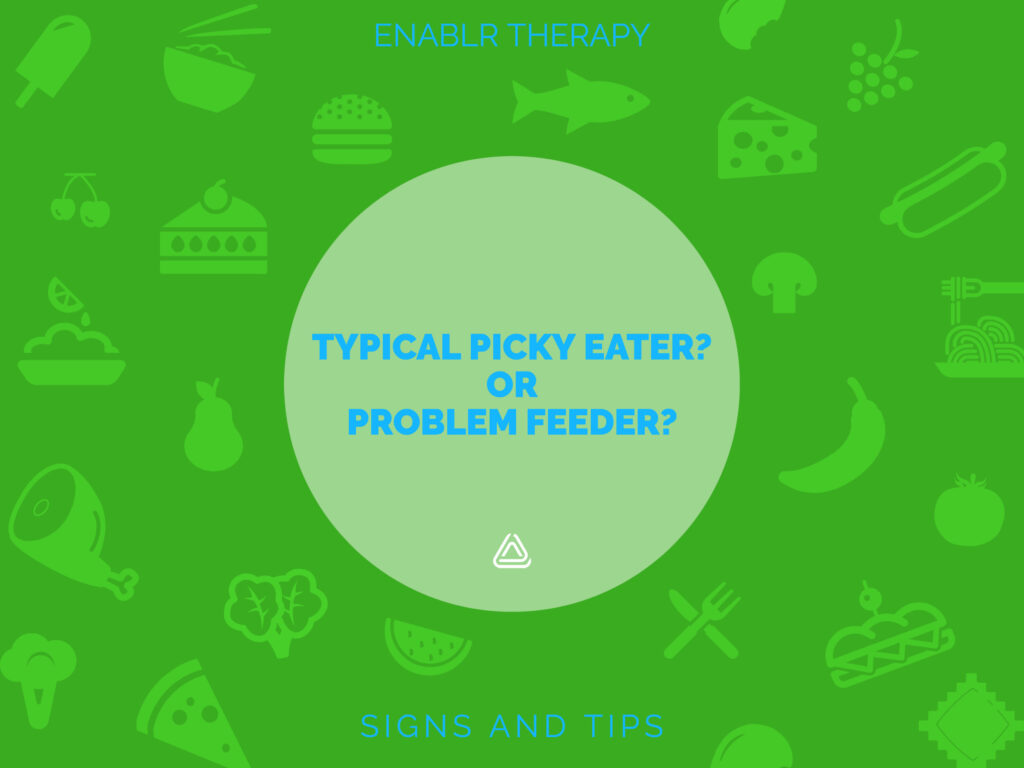
It is normal for kids, especially in the toddler years, to develop food preferences and picky eating. This stage can be a bit unpredictable and unnerving with your child loving a particular food on one day and then flat-out rejecting it on the next.
As a parent, you may be wondering if you should be concerned by your child’s limited diet or reactions to different foods. Below is a chart that compares some traits of typical picky eaters with problem feeders.
If you have concerns about your child’s picky eating, Enablr Therapy can help. We have expert speech language pathologists and occupational therapists who can work with your child, family, and doctor to address underlying feeding concerns.

Go to our therapy services page to see how we can help!
Problem Feeders
Typical Picky Eaters
Food Variety
When listing all of the food the child will eat, usually has at least 30 different foods.
When listing all of the food that the child will eat, usually eats less than 20 different foods.
Textures
(puree, soft, chewy, crunchy)
Generally eats at least one food from each food or texture group.
Will decline foods from an entire food group or texture group.
May gag, shiver, or vomit at the sight, smell, taste or texture of some foods.
Food Groups
(Proteins, Veggies)
Will eat foods that are similar (ie- willing to eat different brands of chicken nuggets).
May cry or have a meltdown when new foods are presented and does not interact with the food on any level.
Food Jags
(eating 1 food over and over and then stops)
Typical will eat the “burn out” food again after a couple weeks.
May get fixated on a particular brand or styles of food (ie- only eat McDonald’s chicken nuggets and not others).
New Foods on Plates
Often will tolerate a new food on the plate and will touch or taste it, even if they need coaxing.
May cry or have a meltdown when new foods are presented and does not interact with the food on any level.
Mealtimes
Many of the foods may be different but eats meals at the same time and place with other family members.
Always eats a different set of food and often eats at different times or places from other family members.
Tips and Tricks for Parents
Picky eating can cause a lot of anxiety and stress for parents and families. Mealtimes can become a regular struggle, and even a battleground. Below are a few mealtime tips and tricks for parents of typical picky eaters.
- Set An Example With Family Mealtimes: Eating as a family gives parents an opportunity to model eating and a healthy relationship with foods. Talking about what you see, smell, feel and taste can promote curiosity, but be sure not to force the issue or conversation. Mealtime should be pleasant and enjoyable. Try to include at least one food that your child likes in each meal and serve small portions to give your child an opportunity to ask for more.
- Try And Try Again: Children need repeated opportunities to try new foods. It can take 10 or more exposures to a food before your child will accept it.
- Make it Fun: Presenting food in fun and creative ways can engage your child in eating. Try cutting food with cookie cutters or serving finger foods with a dipping sauce.
- Involve Your Child: Include your child in mealtime preparations like shopping and cooking. Allow them to pick out a vegetable or fruit that they want to try and help prepare it. The more involved the child is, the more invested they may be in eating.
- Avoid Using Dessert As A Reward: Bribing with desserts or other food treats can reinforce that the “prize” food is the best and the other food is a non-rewarding chore. Of course, this has the opposite effect than intended. Bribing also sets the stage for unwanted negotiations and power struggles at mealtime.
- Use Food Chaining: Try serving foods that are similar in color, texture or flavor to foods that your child currently eats. For example, if your child likes sweet potatoes, try mashing them and then move to mashed carrots. Or if they like GoldFish, try different colored GoldFish or a different shaped cheese cracker. Making a change to only one aspect of the food may help your child to accept a new food.
If you need support to work through mealtime issues, Enablr Therapy can help. With skill, knowledge, and care, our therapists work with kids of all ages to treat a wide range of issues resulting from developmental delays, injury, illness or trauma. Whether your child has motor delays, speech difficulties, or sensory issues that interfere with feeding, mealtime routines, or other daily activities, we are here for you!




